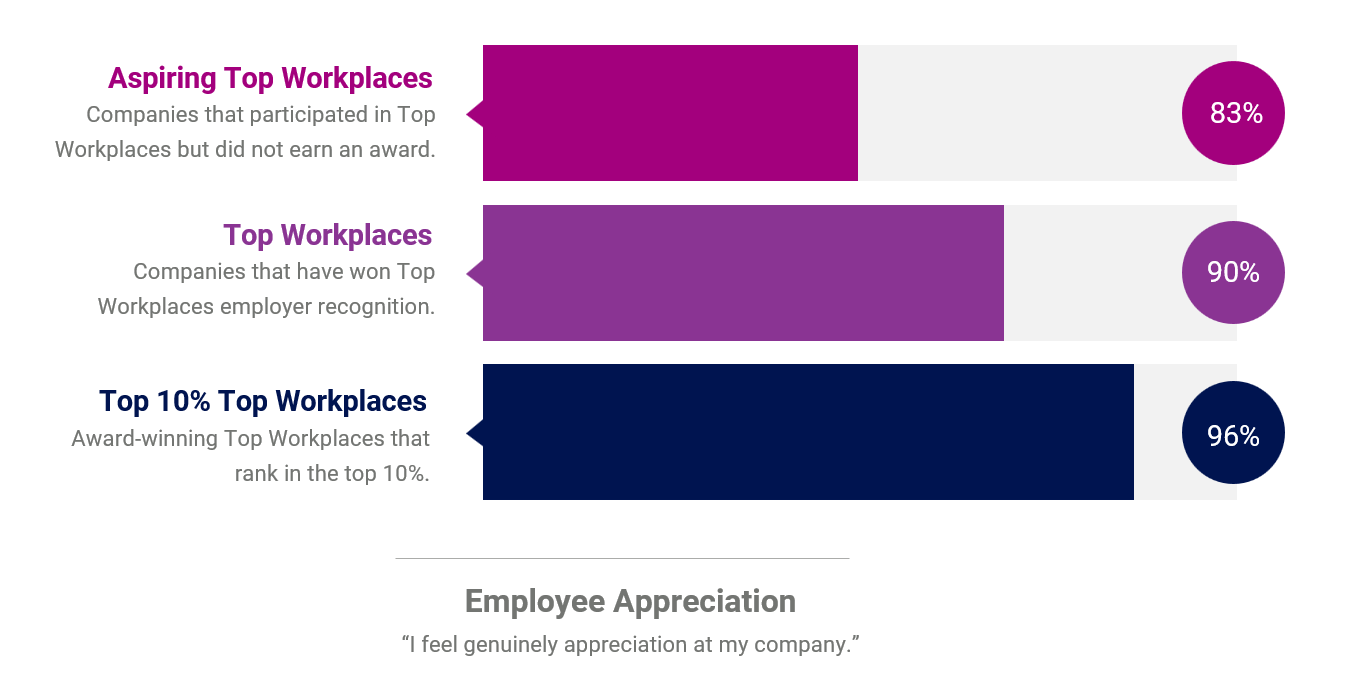Employee Appreciation Day is Friday, March 4. Isn’t that nice? It celebrates the feel-good connection between workers and the workplace. But let’s be real. Done right, workplace appreciation is not a single date on a calendar. It’s something high-performing workplaces practice year-round.
Top Workplaces are better at showing employee appreciation
When Energage reviews employee sentiment, it’s clear that the best workplaces are better at showing appreciation to their employees.

An analysis of more than 3 million employee surveys from January 2020 through August 2021 shows employees who work at companies that earn Top Workplaces recognition are more likely to feel appreciated – by seven percentage points – than employees at companies that did not rate as Top Workplaces.
That gap in appreciation sentiment widens to 20 percentage points when comparing the highest-rated companies to the lowest-rated companies.
The data reveals some common-sense insights about appreciation. Employees who earn less (especially less than $30,000 annually) are less likely to feel appreciated. Rank-and-file team members are less likely to feel appreciated than senior managers.
But here’s something intriguing: The workers who feel most appreciated are newer employees (those who work for a company for a year or less) and veteran employees (those with a company for five years or more). The ones in the middle – especially those with a company for three to five years – feel least appreciated.
How Top Workplaces show appreciation for employees
So how do the best workplaces convey appreciation of all employees, regardless of pay, seniority, and role? The answer is that there is no single way to show appreciation. But there are common themes based on feedback Energage received from dozens of highly-rated workplaces. Here are some employee appreciation ideas to consider:
Build it into the culture: Gratitude is a key value at organizations where workers feel most appreciated. A steady stream of appreciation year-round helps people through stressful times. “Consistency is key with appreciation. It’s not just one big event,” one HR leader said.
Have a system: Workers want to be acknowledged when they exceed expectations. It could be public recognition or expressed quietly with a hand-written note. Employee appreciation should come from peers as well as leaders. Honor people for their time, talents, assistance, and insights. As one HR leader said, “It’s important to us that recognition doesn’t become some sort of wayward byproduct because, when it’s tangible, the natural results are loyalty and retention.”
Get personal: The best companies value relationships and the quality of life of their employees. Especially with remote work, employers need to find ways to get people to know each other. One person described this as the value of “being known.” Managers need to know who they are leading and vice versa. Bring people together with culture clubs (cooking, book, exercise, gardening). Throw parties and picnics. Organize volunteer events. “You will end up with a group of kind and genuine people, which helps with retention,” one HR leader said.
Recognize people differently: Not everyone wants to be recognized the same way. Consider a recognition questionnaire that asks how people would like to be recognized and some of their favorite things.
Adjust to conditions: The pandemic allowed companies to show appreciation in ways not done previously. Employees who need help dealing with childcare, eldercare, or a change in housing are better able to invest themselves under better circumstances. Help them find that balance.
Leaders listen and respond: Most employees value being heard more than perks. People want opportunities to share ideas, complaints, suggestions, and observations. Leaders need to listen and respond.
Go beyond pay and benefits: Employees consider pay and benefits the binding contract in the employer-employee relationship. Appreciation reflects discretionary effort beyond those terms. Milestone benefits, such as anniversaries, are a nice gesture.
Support professional growth: This is key for those middle-tenured employees who tend to feel less appreciated. When employers see the potential in people and offer training for hard skills and leadership development, it gives employees a reason to invest more of themselves in the organization.
Promote people internally: A culture that encourages, trains, and rewards people for increasing responsibility will boost retention.
Gifts are nice: Gift cards, food, clothes, keepsakes. Raffles for prizes. People appreciate even small, meaningful gifts to acknowledge a job well done.
But aside from the feel-good stuff, perhaps the greatest sign of appreciation an employer can give is to believe their employees can do good work. “I give them a job that’s hard and trust they can do it,” one leader said. “It’s amazing to see what our staff can do.”
Employees want to feel they matter. And when they do, they’re more likely to give more of themselves … and stay for the long haul when they do.
Find Top Workplaces that excel at employee appreciation
Each year, Energage publishes the Top Workplaces for Appreciation Culture Excellence list, the employer recognition award that celebrates companies who excel at making appreciation part of their everyday culture.
If your company excels at employee appreciation, get recognized for it. Nominate your organization for Top Workplaces, the employer recognition program that offers awards in 60+ regional markets as well as national awards for culture and industry excellence.

 Stand out with an award-winning
Stand out with an award-winning